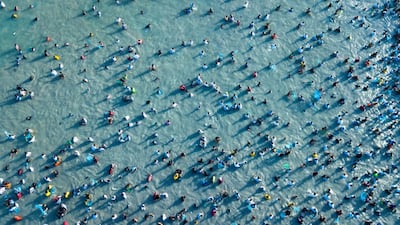The world's ocean experts are descending on Abu Dhabi this week for the World Ocean Summit. One of the greatest issues facing the seas is its dwindling fish stocks, a commodity that billions of people around the world depend on for food and work. Here are five myths about seafood and what it means for safety, security, and sustainability.
The first is that illegal fishing is only an environmental Issue. Illegal, unreported and unregulated (IUU) fishing is an illicit industry that, by some estimates, is valued at more than $36 billion. Currently, about 90 per cent of the world’s fish stocks are at the point of being depleted or worse, but demand will increase by 21 per cent by 2025. The global decline of the world’s fish is driving conflict globally. Indonesia has blown up ships found illegally fishing in its waters, Argentina is using military force to protect its exclusive economic zone from illegal fishing and, in the South China Sea, the US Department of Defence has called the Chinese fishing fleet a “maritime militia”.
Competition over natural resources has been a constant driver of conflict throughout history. Communities and countries have fought battles over access to oil, water, valuable spices, sugar and more. Now they could be fought over fish, because billions of people depend on seafood for their nutritional needs and to make a living.
Then there’s the fact that most people, understandably, believe that the fish they buy is what it says on the label or the menu. In 2016, the NGO Oceana released a report detailing the global scale of seafood fraud – and it was massive. It found that one in five samples of seafood that were tested worldwide was mislabelled – and it sampled 25,000. Oceana also reviewed hundreds of studies on seafood fraud from 55 nations on every continent except Antarctica, and found that the fraud was ubiquitous.
Not only is seafood fraud a global problem, it is also one that exists in every sector of the seafood supply chain from landing, packaging and processing to distribution, wholesale and retail sales.
So, the grouper or cod or snapper you eat may not be what you think it is. In the US, prosecutors have taken on some of the biggest offenders. Last summer, the owner of a prominent Virginia seafood company was convicted of mixing “distressed” crabmeat from Indonesia, Brazil and other countries with higher-quality crabmeat from the US and labelling it as a product of the USA. But such prosecutions are rare.
Similarly, many people believe that the fish they eat is fresh and wild. However, the odds are better than even that it is farmed, not fished. Aquaculture supplies more than 50 per cent of all seafood produced for human consumption globally. Even if your fish is labelled “fresh,” it probably isn’t. Many large fishing vessels stay at sea anywhere from three to 24 months, storing the fish on ice in the hold. Therefore, when you pick up your fish at the grocery or fish market, or order it at a restaurant, it has most likely been in a deep freeze for up to two years. Yet it is still considered fresh. The upside to this is that fish stored in this way is arguably safer to eat, because freezing preserves it and kills parasites.
There is also a widely held belief that seafood is not wasted. However, given that it is a relatively expensive source of nutrition, the amount of fish that is thrown away is truly surprising. The UN Food and Agriculture Organization (FAO) recently reported that an estimated 35 per cent of fish catches are discarded. In some instances, such as shrimp, for every kilogram of the target species caught, six of other species are also caught alongside it that are unwanted or unsellable. Known as bycatch, this surplus is often thrown overboard dead because it would not be economical to waste space in the ship’s hold for low-value or unwanted species.
Bycatch is also bad for the ocean because it can also include critically endangered species, such as turtles and whales. The average global citizen consumes about 20kg of fish per year but has the average impact of eating more than 27kg, including species that are being hunted almost to extinction.
Then there is the widely held perception of fishing as a highly profitable business. According to a recent study, more than half of modern-day fishing activities on the high-seas would not be profitable without government subsidies that help prop up the fishing industry, or worse yet, forced labour. Japan, Spain, China, South Korea and the United States all subsidise some aspect of their fishing sector.
Subsidies have enabled, for example, China to build the largest and farthest-ranging fleet of fishing vessels in the world. The World Trade Organization (WTO) has been negotiating reduced fisheries subsidies since 2001, but so far to no avail.
According to a recent study, in 2016, forced labour in seafood work was reported in 47 countries, including south-east Asian and western nations alike. Retailers are very concerned about this issue now, and there are increasing efforts to spotlight human rights abuses aboard some nations’ high seas fleets, but more needs to be done.
Seldom is there a simple solution to a problem this big. But there is one thing that could be done that would be a great first step – for all countries to make their fishing vessel tracking data public. With greater public awareness and accountability, we could make great progress on cleaning up the fishing industry and making it more sustainable.
Johan Bergenas is Senior Director for Public Policy at Vulcan Inc., the organisation created by Microsoft co-founder Paul Allen. Monica Medina is the founder and publisher of Our Daily Planet and a non-resident Senior Associate at CSIS

